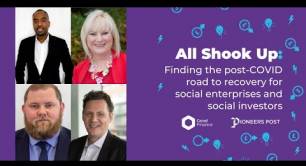Squeezed health and social care enterprises lean on proactive social investors
As healthcare social enterprises bear the brunt of the Covid-19 crisis, a close relationship with impact investors is proving key in helping to deliver their mission.
This was the message from speakers at Wednesday’s ‘Planning for a brighter future’ webinar, co-hosted by Pioneers Post and Good Finance.
Brian Bolt, finance director at St Helena Hospice, said healthcare organisations like his are facing a huge challenge, being “stretched in two directions”: loss of income on one side, and increased demand for services on the other.
As the Covid-19 crisis unfolded last year, the organisation, which cares for terminally ill patients, has been “at the forefront of what happened”, said Bolt.
Currently, the hospice is caring for Covid patients transferred from NHS hospitals, while supporting its usual service users through the last stages of their lives.
Meanwhile, the organisation had lost major streams of income during the pandemic – from its lottery, charity shops and fundraising events, Bolt explained.
St Helena Hospice took on £1.5m of social investment from Big Issue Invest, the social investment arm of The Big Issue magazine, in 2019. That helped the business to grow its lottery fundraising stream, until the pandemic hit.
“Always assume the worst can happen and make sure your income is as diverse as it can be,” Bolt advised.
Social investment is more than a concessionary interest rate and a vague promise that we’ll be nice if things go wrong
The relationship between investors and investees had proved crucial during this crisis, Mark Bickford, chief investment officer at Social and Sustainable Capital, said. While some borrowers had to close shop due to government coronavirus restrictions (community nurseries, for example), they were still able to access grants and loans from investors with whom they had a close relationship, he explained.
“The collaboration and importance of having strong relationships has really stood out for us,” he said.
Jonny Page, investment manager at Big Issue Invest, also acknowledged the importance of a strong connection with borrowers – saying this had to be built from the very start of the partnership.
He wanted to be, he said, the first investor borrowers would call if they had a problem – not the one they were scared of and calling only as a last resort. And this is what happened: Page described the phone ringing constantly at the outset of the first lockdown, with investees asking for advice and guidance.
This year had seen many conversations with borrowers who were facing major loss of income, Page said, to figure out how repayment holidays and changes in loan terms could help them get through the crisis. “The product you initially invested in pre-2020 might not be the best going forward,” he said.
For SASC’s Bickford, the role of investors was above all to support investees proactively. Citing a social entrepreneur who had once dismissed social investors as ‘just bankers in sandals’, Bickford acknowledged that SASC might have been guilty of this in the past.
But that had changed, he said. “Now we see our job increasingly as trying to understand what kind of risk stops social enterprises expanding and adding more of what they do, and working out which of those risks we can actually pass on to investors. To come up with funding solutions that are genuinely different… more than a concessionary interest rate and a vague promise that we’ll be nice if things go wrong.”
The webinar, ‘Planning for a brighter future: Lessons for 2021 from social entrepreneurs and social investors on the frontline of health and social care during Covid-19’, was produced by Pioneers Post and our partner Good Finance. As well as the speakers named above, we also hear from Maria Mills from Active Prospects, and Sara Hawkins from Projekt42.
Watch the full discussion in the video above.



